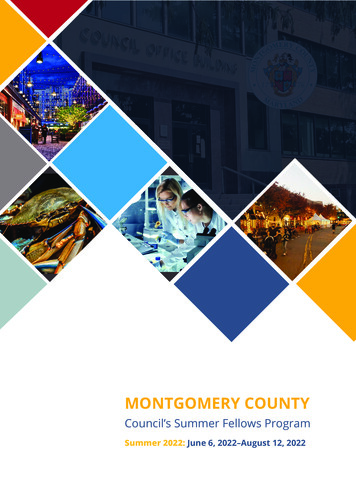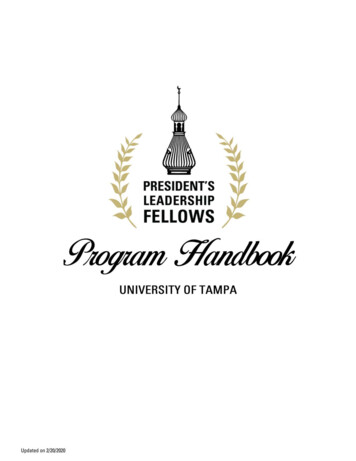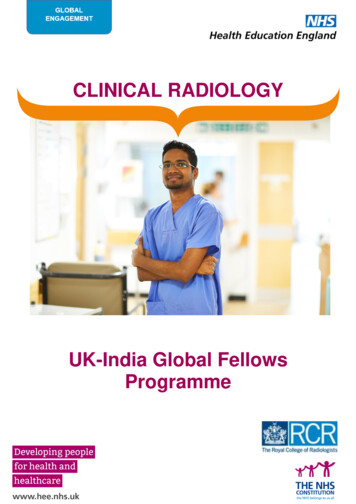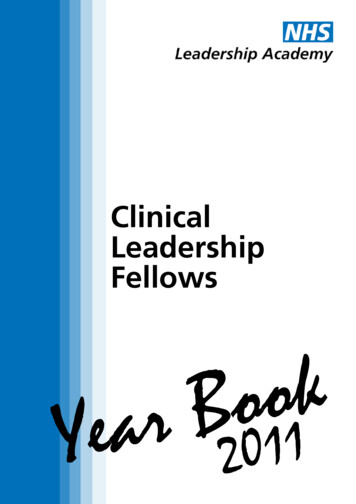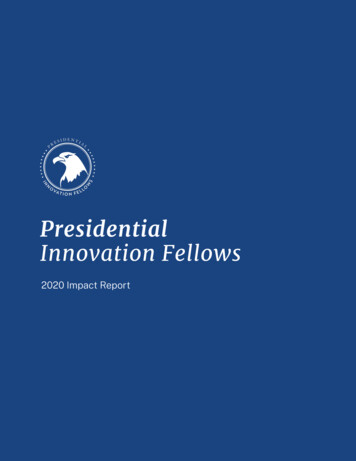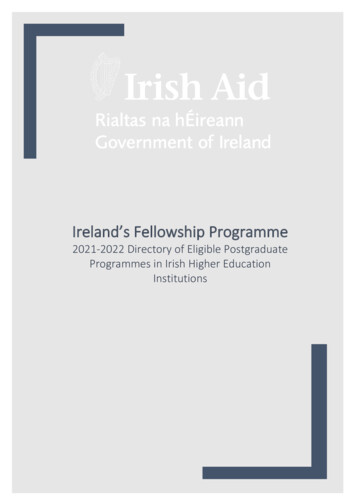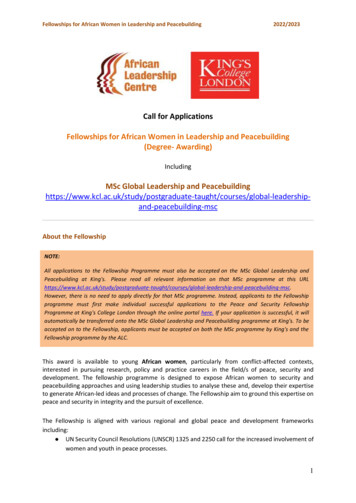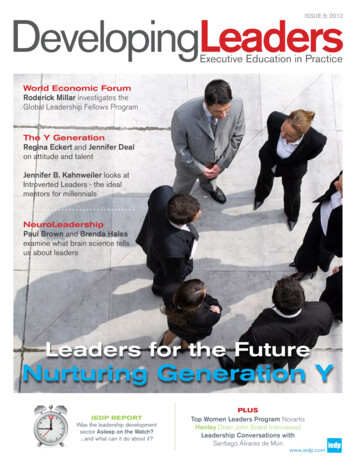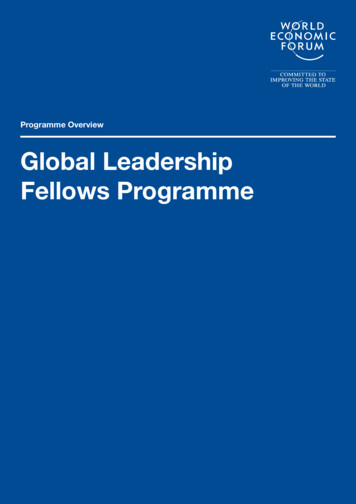
Transcription
Programme OverviewGlobal LeadershipFellows Programme
2Global Leadership Fellows ProgrammeOverviewThe enormous scale, complexity andurgency of the challenges facing theworld today call for more responsiveand responsible leadership. Thismeans leaders who have the visionand values, the character andcompetence, to shape the futurewhile also balancing the polaritiesbetween short- and long-term goals.Developing leaders who can understand and navigate complex,dynamic systems is one of the best ways of addressingthe future’s many challenges. Systems leadership is aboutcultivating a shared vision for change - working together with allstakeholders of global society. It’s about empowering widespreadinnovation and action based on mutual accountability andcollaboration. The Global Leadership Fellows Programme(GLFP) of the World Economic Forum is a commitment tomaking this happen, by developing System’s Leaders forPublic-Private Cooperation.The GLF programme combines academicinspiration from leading universities, on thejob training through the Forum’s engagementwith global challenges, and individualdevelopment and executive coachingsupport. The three-year learning journey isdesigned to provide Fellows with the tools,frameworks and experiences required todrive systems-level change through publicprivate cooperation.The programme helps Fellows discover,understand, and develop three dimensionsof leadership: self, others and systems.The journey starts with the individual (self):understanding motivations, purpose andvalues, as well as the desire to lead, learnand understand the perspective of others.Leaders need to know who they are andwhat they stand for; they need to be able torecognize what strengths they can leverageand the potential obstacles that will hindertheir impact.Building on this path of self-discovery, thejourney focuses on understanding others:individuals, teams and communities. Itemphasizes building bridges that will helpFellows understand their impact on, andperspective of, others as well as what itmeans to lead and manage people and workin teams. A particular focus is placed on themindset and skills required to create a sharedvision and curate dialogue and engagementtowards impact.Lastly, the journey places particular emphasison how leaders operate within, and helpshape, current and emerging systems. Thismeans leaders must learn not only how tocontextualize and map their interconnectednetworks, but also to understand how thecomponent parts - issues, actors, initiatives– are interrelated, and how they impactother systems.
3Global Leadership Fellows ProgrammeProgramme at a Glance4Up to four-yearprogramme2012Academic modules50%50%Public sectorPrivate sectorCandidates selectedannually2005Inaugural year ofthe Programme6World-leadingPartner Institutions6,000Applicationsper year253GLF Alumni
4Global Leadership Fellows ProgrammeThe CurriculumTo facilitate and personalise the development of Systems Leaders for Public-Private Cooperation,the programme uses three learning spaces:13AcademicModules2The Academic Modules are thefoundation of the programme andserve as a platform to develop newinsights and skills. Each modulebalances traditional and experientialapproaches, and are stronglyintegrated into the other twolearning spaces.See more on pages 5 and 6Coaching &MentoringCoaching is used to accelerateleadership development. Thecoaching process is designedto be flexible and personalisedto each Fellow’s learning needs.Alongside professional coaches,Fellows benefit from formal andinformal peer-to-peer coachingand learning opportunities.See more on page 7On-the-jobLearningOn-the-job learning is an integralpart of the programme. Each Fellowholds a full-time position in one ofthe Forum’s teams, where they areresponsible for managing projects ora community of stakeholders, whichincludes leaders from business,government, civil society andacademia. Each Fellow will rotateto a new role at least once duringthe programme.See more on page 8
5Global Leadership Fellows Programme1. Academic ModulesThe programme consists of 12 modules over a three-year learning journey, focused on helpingFellows discover, understand, and develop three dimensions of leadership: self, others and systems.The modules have been designed to provide Fellows with the tools, frameworks and experiencesrequired to drive systems-level change through public-private cooperation.Module 1Module 2Building FoundationsThe Leader Within‧‧ Develop a growth mind-set that leadsto a desire to learn and embracechallenges; to persevere despiteobstacles and to see sustainedeffort as path to mastery‧‧ Explore personal leadershipin an organizational contextWorld Economic Forum‧‧ Learn how to give and receivefeedback, develop a feedbackculture and motivate and inspireothersModule 4INSEAD‧‧ Understand the psychologicalfoundations of leadership‧‧ Cultivate greater self-awareness as aleader through feedback and reflection‧‧ Identify and understand competingcommitments that could impactpersonal changeModule 5Understanding andInfluencing ComplexSystemsProblem SolvingThrough DesignThinking‧‧ Learn how to use systems thinking tobetter understand and map the keyissues, actors, initiatives of complexnetworks and challenges‧‧ Learn the fundamentals of designthinking and how individuals andorganizations apply it to solveproblems for strategy developmentand organizational changeWorld Economic Forum‧‧ Discover how these components areinterrelated and influence each other,and learn how to identify key leveragepoints of change within the systempoints of change within a system‧‧ Learn how to see the world andits interdependencies in new anddifferent ways, and how to innovateand lead from a more inclusive andholistic perspectiveTHNK‧‧ Understand and experience themindset required, and the basictools needed, for each stage ofthe design thinking process‧‧ Design and develop new waysto approach problem solvingto achieve impact at scaleModule 3Leading and Workingin TeamsWorld Economic Forum‧‧ Understand and explore the structuralcharacteristics of high-performingteams and the dynamics whichsupport and advance them‧‧ Learn how to influence and leadwithout having formal power andauthority‧‧ Recognize and understand thefundamentals of team dynamics inorder to inspire progress, use diversityas a strength, and manage conflicttowards positive outcomesModule 6Leadership in SystemsINSEAD‧‧ Recognize, and work with, thesubtle and often unconscious forcesthat underpin the emergence andeffectiveness of leaders in systems(i.e. aspirations, fears and desires;social forces primed by culture,norms and expectations)‧‧ Learn how the experience andbehaviour of leaders are often rootedin, and driven by, both psychologicaland social factors; understand theimportance of the dynamic andinterface between the self, othersand systems
6Global Leadership Fellows ProgrammeModule 7Module 8Curating Dialoguesfor ImpactLeaders FindTheir Voice‧‧ Learn how to listen in order to betterunderstand, elevate, and synthesizethe quality and value of the discussion‧‧ Learn and practice how tocommunicate with vision,purpose and presence‧‧ Understand and practice how to askcritical questions to ensure meaningfulprogress, and understand theemotional drive of individualsand groups‧‧ Shape different types of storiesand narratives using rhetoricalskills and strategiesWorld Economic Forum‧‧ Design and facilitate inclusiveand constructive discussionsand processes that lead to acommitment to actColumbia School of the Arts‧‧ Develop leadership presence throughmindfulness practices, breathing andcentering techniques and effectivelyconnecting with an audience‧‧ Explore and practice storytellingtechniques that inspire and effectivelycommunicate powerful narrativesModule 10Leadership in 4IROxford Said School of Business‧‧ Learn how to be comfortable with andmanage situations of ambiguity anduncertainty relating to technologiesand their impacts‧‧ Be sensitive to the emotional, physicaland cognitive aspects of how humansrelate to technology - and understandhow to “flex” between modes ofperceiving‧‧ Explicitly recognize and practicethe different skill sets relevant tounderstanding and influencing thesystemic impacts of emerging techModule 11Module 9Managing for ResultsLondon Business School‧‧ Learn the key responsibilities requiredto lead and manage in today’s worldof work‧‧ Understand organizational culture asa means of motivating and managingperformance‧‧ Diagnose the root causes of keyleadership and management issues,and the power of organizationalcongruence for driving timely andrelevant solutions‧‧ Analyse the behaviours and actions ofeffective managers, as well as thosewhich can lead to poor resultsModule 12A Systems Deep-Dive:The China ContextReflection andPerspective‧‧ Develop a deep understanding ofChina’s heritage and the opportunitiesand challenges of a new era‧‧ Reflect on the individual and collectivechanges made through the three-yearGLF journey‧‧ Explore systems leadership froman economic, political, societal andculture perspective;‧‧ Distil the learnings and develop anintegrated approach to mapping yourongoing personal and professionaldevelopment processCEIBS‧‧ Learn about China’s vibrant innovationecosystem and its pioneeringbusinesses, research centres andstart-ups; learn how leaders areanticipating key tipping points andtheir systemic impact on businessmodels and value creationWorld Economic Forum
7Global Leadership Fellows Programme2. Coaching & MentoringCoaching and mentoring is a key pillar of the GLF programme, focused on helping Fellows achievegreater awareness and impact, develop and sustain new perspectives, and facilitate deeper learningand growth. The coaching process is personalised to meet the individual needs of each Fellow.GLF Coaching& SupportINSEADCoachingIndividualCoachingOccurs throughoutthe programmeYear 1: FebruaryYear 1: MarchY1 – April Y2Define purpose and focusBuild awareness viaassessment toolsDevelop growth mindsetIn Group: Reflect –Integrate – DoLearn from the group/supportDefine development goalsFocus on developmentIntegrate team andstakeholder inputIntegrate EFLECTIONYear 2: March – ongoingYear 2: March - ongoingPractice coaching skillsClarify developmentplan/journeyReflection is critical togenerating deeper insightfor self, others and systemsand is an on-going exercisethroughout the programmeReflect – Integrate – DoLearn from each otherRefine professional narrativePlan and revise tools
8Global Leadership Fellows Programme3. On-the-job LearningGlobal Leadership Fellows are exposed to a wide variety of leadership challenges and developmentopportunities in their role at the Forum, spanning knowledge creation, to project management, tocommunity curation. Throughout the three-year programme, Fellows rotate at least once to anotherrole in the Forum providing the opportunity to experience different parts of the organization.What your job might look likeMuzi LiMedia Lead, ChinaI work closely with internal and external stakeholdersto design, implement and measure the Forum’s publicengagement strategy in China. I also help manageand grow relationships with China’s major mediaorganizations, which including both traditional mediaand new media. I also work to identify opportunitiesto place content on Forum’s non-Chinese platforms.Sheikh Tanjeb IslamCommunity Lead, Regional Agenda,India & South AsiaMy main responsibility is to manage the relationship withrepresentatives of governments from Bangladesh, Bhutan, Pakistanand Nepal. This includes enabling governments and countries toscale and advance mission relevant initiatives and projects utilizingthe Forum’s platform for impact. I also conduct research on topicsand projects relevant to the region, and act as the Forum’s keyadviser on government and policy in my portfolio countries. I amalso monitoring policy priorities of region’s governments to ensurethat the Forum’s work on the region is cutting-edge and up-to-date.Felipe BezamatProject Lead, Shapingthe Future of productionMy primary responsibility at the Forum is to develop multistakeholder dialogues to help countries and business leadersbuild awareness of the changing nature of production, determinehow to best prepare to benefit from this transformation, andcollaborate across the public and private sector to enhancereadiness. I also help design and produce relevant insightproducts and develop strategies to help advance on thefuture of production and manufacturing.Anelia UzunovaBusiness Engagement Lead,Centre for CybersecurityMy role as the lead for Business Engagement is to deliver on ourmission of creating a safer cyberspace. I see myself playing the role ofa connector – collaborating closely with the wider Forum in identifyingsuitable companies to engage, understanding the partners’ needsand pain points in better shaping the Centre’s value proposition tobusiness, and working with the Centre’s delivery functions to ensurewe translate this into concrete initiatives that can deliver valuable,tangible outputs to our constituents and society at large.
9Global Leadership Fellows ProgrammeWhy Join?“There are some issues that are too bigfor any one country or company to tacklealone and there are public goods that needeveryone’s defense and support. I joined theForum precisely to work on those challenges,like cybersecurity, where we need a globalapproach recognizing that individuals,national governments, and firms all need topull together to build new, more inclusiveand adaptive solutions. The GLF Programmehelped me to develop the skills I need inorder identify these challenges and to leadmy team at the Forum as well as my partnersfrom government, civil society and the privatesector around the world to think systemicallyin order to solve real and seeminglyintractable problems.”Daniel DobrygowskiHead of Governance & PolicyCentre for Cybersecurity“I joined the World Economic Forum in 2015to manage Strategic Partners from thetechnology sector. I was inspired by theopportunity to work with companies leadingchange in the Fourth Industrial Revolutionand support their engagement in theForum’s work.Earlier this year as part of the GLFprogramme I had the opportunity to take thislearning and rotate to the Forum’s Centre forthe Fourth Industrial Revolution. My role at theCentre is to develop and manage our Partnercommunity in San Francisco, bringing onboard new partners aligned with the Centre’smission and to ensuring current partnersderive the most value from its work.”Ruth HickinPartner Engagement LeadCentre for the Fourth Industrial Revolution“The Forum is a very unique place both inhow it functions as the only InternationalOrganization for Public-Private Cooperationand how non-hierarchical and dynamic theworkforce is. Over the past 6years, I havesharpened my skill-set interacting withtop leaders from across the world whileworking on some of the most complexsystemic challenges facing our world today.I believe that the Global Leadership Fellowsprogramme and World Economic Forumcan support those on a journey to seeknew thinking and solutions.”Akanksha KhatriHead,Centre Strategy & ManagementCentre for Global Public Goods“The challenges of our time require globallycoordinated action and an alignment ofvarious stakeholders’ interests throughcreative dialogue and attention to purpose.I joined the Forum to lead and navigate theprocess of understanding these interests,synthesizing them, and creating solutions thatlead to healthier populations. My backgroundin health and education, in the US andglobally, convinced me of the necessity of asystemic, multistakeholder approach to theworld’s challenges; I take this approach nowin leading the Forum’s portfolio on globalmental health. The GLF programme hasaided me in this work, giving me a betterunderstanding of dynamics at play in systems,within groups, and within myself. Theexperience and skills of the program will proveuseful throughout my career and my life.”Peter VarnumProject LeadShaping the Futureof Health & Healthcare
10Global Leadership Fellows ProgrammeHow to Apply?We seek individuals who are curious, collaborative and critical thinkers, often characterized bya strong will to succeed and the service-oriented humility to contribute to the Forum’s mission.CriteriaThe programme recruiting will happenthrough jobs that you will find listed here.Use the job category filter to search forthe jobs that are tagged with the GlobalLeadership Fellows Programme. The belowlist gives an overview of the key criteria welook for in candidates applying to the GLFPSteps in the Application ProcessAn overview of the application is provided below. After each stage, candidatesare notified of their status with all successful candidates invited to the next stage.1Online Application2Video interview (Sonru)3HR call4Written Essay5Skype interview6Assessment Centre7Final interviews8Offer‧‧ Between four and eight yearsof full-time work experience‧‧ Master’s degree or equivalent, from anaccredited university, in any discipline‧‧ A high level of intellectual curiosityand humility‧‧ Excellent verbal and writtencommunication skills‧‧ Strong organizational and projectmanagement skillsSubmit your CVComplete an online video interviewComplete a HR screening call‧‧ Ability to think conceptually andglobally about a broad range of issues‧‧ Ability to engage and interact withhigh-level stakeholders and presentinformation with confidenceComplete a series of short essays‧‧ Adaptable and resilient; able to thrive inan ambiguous and dynamic environmentEngage in a 90min interviewParticipate in a full day seriesof assessments at the Forum CentreParticipate in a full day series of interviews withhiring manager, peer group and cluster headAn offer is extended subject to clearing of reference checks
11Global Leadership Fellows ProgrammePartnersThe academic modules of the GLF programme are developed in partnership with leading globalinstitutions. Working together with the Forum, the partners provide a dynamic platform thathelps every Fellow put an original mark on leadership, within and beyond the Forum.CEIBS, linking East and West inteaching, research and practice,gives the Fellows a global edgeand unparalleled insights on China.Columbia University offers theopportunity to collaborate with its manyschools, exploring a range of disciplinesfrom the arts to public health.INSEAD provides exceptional knowledgeand expertise in coaching, and thepersonal as well as systemic aspectsof leadership.London Business School offersunique perspectives on the futureof management and equips fellowswith the skills needed to thrive in it.THNK is a ‘C-School’ that providesFellows with design-thinking andother collaborative tools for catalysingpositive change at scale.Oxford Said Business school focuses on trendsthat will define the future, the organisationsthat will shape it, and their leaders, enablesthe School to uphold the centuries-oldtraditions of the University of Oxford.“For the past five years, ColumbiaUniversity School of the Arts haspartnered with the GLF programme ona unique week called Taking the Stage.Together we have invented an originalcurriculum that brings art, artists,theatre, and voice training to theFellows. We have invented the conceptand the actualisation together – refiningit through practice each year.”Carol BeckerDean of Faculty and Professorof the Arts Columbia UniversitySchool of the Arts“The GLF programme is as ambitiousand generous as the leaders itdevelops. It is a comprehensive effortto develop leaders whose impactgoes beyond improving the bottomline. And it deliberately sets out tobenefit organisations beyond theForum. The GLF helps mobile, talentedprofessionals forge a sense of purposeand social commitments that will servethem well, and help them serve well,as leaders.”Gianpiero PetriglieriAssociate Professor of OrganisationalBehaviour INSEAD“The GLF programme is a veryimpressive programme that createsopportunity for all of us: the Fellows,the faculty, the Forum and waybeyond. It’s a chance to shape a newkind of leadership that can inspire,engage and lead the world to newsolutions. At THNK, we’re excited andhonoured to be part of the journey.”Mark VernooijPartner, THNK Schoolof Creative Leadership
The World Economic Forum,committed to improving thestate of the world, is theInternational Organization forPublic-Private Cooperation.The Forum engages theforemost political, businessand other leaders of societytoshape global, regional andindustry agendas.World Economic Forum91-93 route de la CapiteCH-1223 Cologny/GenevaSwitzerlandTel 41 (0) 22 869 1212Fax 41 (0) 22 786 2744contact@weforum.orgwww.weforum.org
The Global Leadership Fellows Programme (GLFP) of the World Economic Forum is a commitment to making this happen, by developing System's Leaders for Public-Private Cooperation. The GLF programme combines academic inspiration from leading universities, on the-job training through the Forum's engagement with global challenges, and individual
